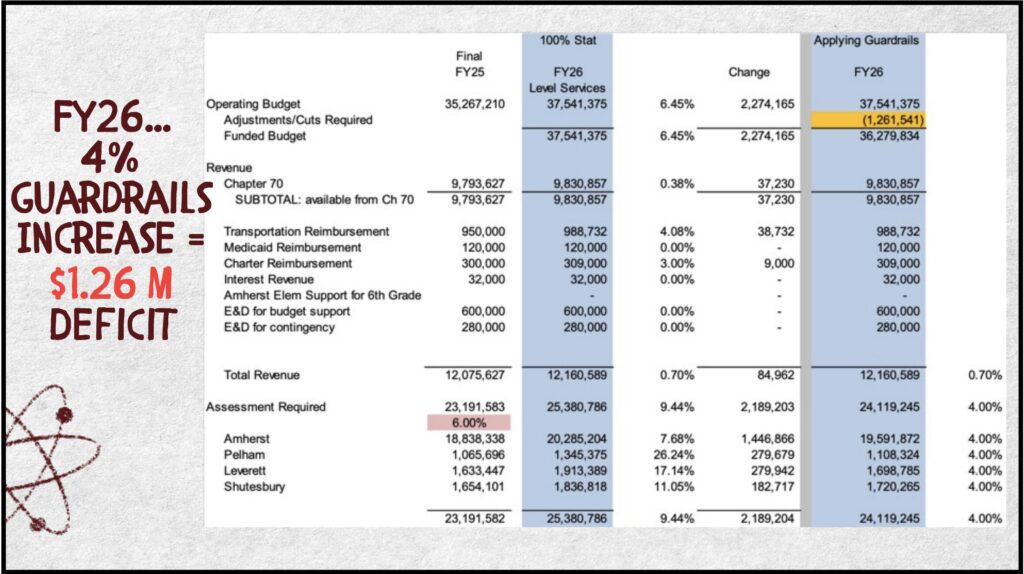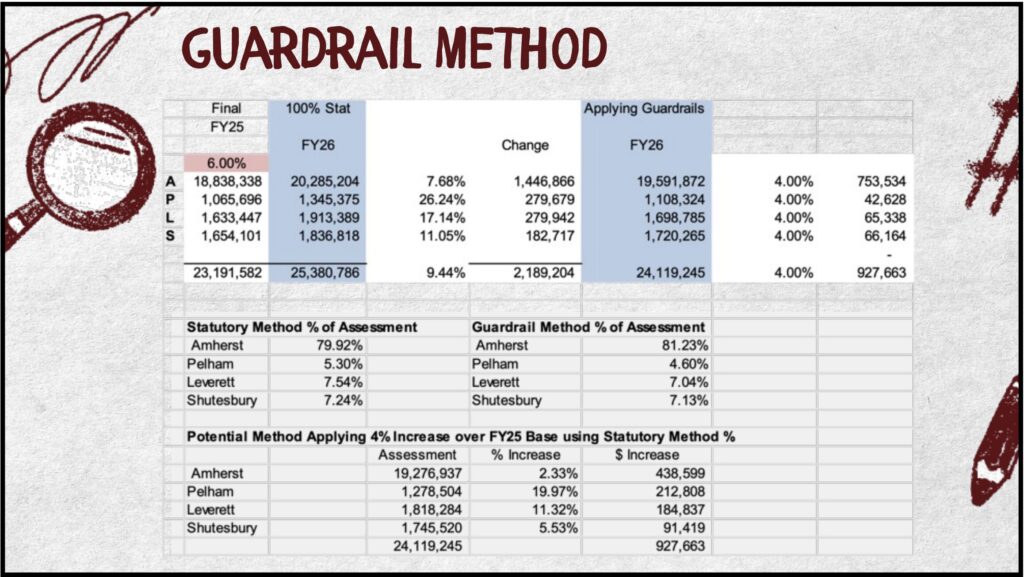Four Towns Meeting Debates Options for Funding Regional Schools

Photo: Shutterstock
No consensus on the FY2026 budget was reached at this meeting.
School Committee members and elected officials and staff from the four towns in the Amherst-Pelham Regional school district met in the Middle School library on December 14 to hear the second report on funding the region’s budget for fiscal year 2026. At the first Four Towns meeting in September the budget deficit was projected to be $2.2 to $3.3 million. By carefully evaluating programming, staffing, and other expenses, School Superintendent Dr. E. Xiomara Herman crafted a proposal that reduced the anticipated budget deficit to $1.2 million. She did not specify what reductions in expenses were made to arrive at this figure. The proposed budget includes $850,000 of school choice revenue and assumes a 13% increase in health insurance premiums, $115,000 in post-employment benefits (OPEB), and a 10% increase in transportation costs.
The region has been using a modified statutory method to determine the assessments of each of the towns. This method takes the state’s recommended funding and adjusts it according to a rolling five-year enrollment projection. In 2023, “guardrails” of 4% were instituted to prevent extreme swings in assessments. With the guardrails in place, no town’s assessment can increase more than 4% over the previous year. To complicate matters further, next year, the schools will lose COVID-19 compensation of federal Elementary and Secondary School Emergency Relief (ESSER) funds. And all four towns increased their contributions from 4% to 6% for FY2025. While Leverett, Pelham, and Shutesbury intended this larger amount to serve as the basis for the FY2026 budget, Amherst pointedly warned that their extra $355,000 was a one-time increase, not to be used in determining future budgets. However, the Amherst Finance Committee recently recommended prioritizing adding the $355,000 to the basis for the regional schools if there is money left over after meeting other budgetary needs. The Town Council has not yet voted on the budget guidelines.
Herman and Interim School Finance Director Shannon Bernacchia presented four scenarios and their likely impacts on the school and town budgets. They compared projections using a 3% increase and a 4% increase over the previous year with the state’s statutory method and with the statutory method with 4% guardrails.
Increasing the towns’ assessments by 3% led to a projected budget deficit of $1.49 million, as opposed to $1.26 million with a 4% increase. To fully fund the gap between the region’s operating expenses and revenue according to the statutory method would require Amherst to increase its contribution by 7.68% over last year’s 6% base. Pelham’s assessment would increase by 26.24%, Leverett by 17.14%, and Shutesbury by 11.05%. The average increase for all four towns would be 9.4%. Employing guardrails and limiting the increase over FY2025 to 4% reduces the budget by $927,663. With the guardrails, Amherst’s increase goes from 7.68% to 2.33%. Pelham goes from 26.34% to 19.97%; Leverett from 17.14% t0 11.32%, and Shutesbury from 11.05% to 5.53%. Amherst’s contribution to the regional school budget increases from 79.92% to 81.23% by applying the 4% guardrails, while the percentage of contribution from the other three towns is slightly reduced.
However, Amherst Town Councilor Mandi Jo Hanneke (at large) pointed out that the 4% guardrails are a cap on the increase in assessment, not an amount to be applied across the board. She also noted that applying the guardrails to the assessments of the smaller towns increases the difference every year between what each town would be obligated to commit by the statutory method and what they actually are assessed using the maximum 4% guardrails.


To even out the increases for each town under the statutory method with guardrails, Shutesbury representatives suggested that Amherst’s assessment increase from 2.33% to 4%, and the $314,000 gained be distributed to the other three towns, so that Shutesbury’s assessment increase remains at 5.5%, and Pelham increases by 7%, and Leverett by 6%. Pelham officials said they might be willing to increase their contribution this year. But Amherst officials objected to the Shutesbury suggestion, saying that the Town Manager has recommended only a 3% increase for each of the four budget divisions in Amherst (town, libraries, elementary schools, and regional schools), not a 4% increase, and the basis for the FY2026 has yet to be determined by the Town Council. Amherst Town Councilor Andy Steinberg (at large) noted the extra budgetary pressure on Amherst, as the largest municipality in the region, offering the example that Amherst is responsible for most of the unhoused population. Amherst Town Council President Lynn Griesemer (District 2) stated that most of the $10 million surplus in Amherst’s FY2024 budget was the result of unfilled positions, and should not be used to increase spending in coming years because it cannot be counted on in the future.
School Officials Respond
Amherst School Committee member Deb Leonard passionately noted that the effects of the COVID pandemic are not over. She said that the social/emotional, mental health, and academic needs of the students remain higher than before the pandemic, and that students experienced trauma due to the pandemic. She stated, “Their lives are in our hands.”
Herman also stressed the necessity of meeting the needs of the students, saying that they are our future. She noted the district’s ongoing efforts to reduce expenses, and urged the towns to do their part. In addition, she said that debating the assessments every year makes it extremely difficult to plan for future years. She urged the towns to agree on an assessment method that will be in effect for several years.
The next Four Towns meeting is scheduled for February 8. Budgets of the schools and towns will continue to be refined as health insurance costs and state aid numbers will be released in January. Contract negotiations with the Amherst Pelham Educators’ Association are currently ongoing.
